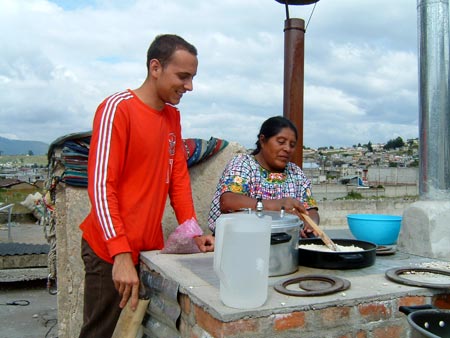Energy
Village-Scale renewable energy in Guatemala. AIDG & XelaTeco provided over 150 families (700+ people) in rural Guatemala with renewable electricity. A micro-hydroelectric system installed for the Chantel and La Fe communities saved them $2000/month in fuel costs during their coffee harvest. Our total installed capacity as of December 2007 is 91 kW.

Helping families breathe easier with cleaner burning stoves. We installed and upgraded 20 biodigesters and improved stoves for rural families in Guatemala. Our higher efficiency stoves cut indoor air pollution, a major ‘killer in the kitchen’.
AIDG Stoves: participatory design at work. Through active community outreach and R&D, AIDG developed stove designs that use 50-60% less wood than a traditional wood fire. For families that buy their fuel wood, this could save them 14-30% of their monthly income.


Sanitation
Waste-to-energy: Home Grown Power in Cap-Haitien. We opened a new office in Cap Haitien, Haiti. In partnership with Oxfam, SOL/SOIL, and the Mayor’s offices of Cap Haitien and Milot, we are starting a project to create a municipal-scale waste-to-energy plant. When online, the plant will serve an estimated 10,000 people, improving sanitation and providing a valuable energy source.
Improving sanitation in Cap Haitien. Working with our community partners, we have already completed a dry composting latrine to serve 300 people in Petite Anse, a neighborhood of Cap Haitien. Building new public latrines and upgrading existing ones will give many more of the city’s residents access to basic bathroom facilities as well as protect groundwater from contamination.


Water
Hot showers for cold kids. As an outreach project for a childcare center in Guatemala, we installed a solar water heater to improve hygiene for the center’s 45 children, particularly during the cold winter months.

Affordable solar water heater. AIDG partnered with the University of California – Berkeley to develop a low-cost solar water heater for under $100. Commercial systems cost $400-$1000.
Water testing. We collaborated with MIT’s D-lab for water quality testing training for XelaTeco. Lack of access to safe drinking water is a major cause of death for children under five.



